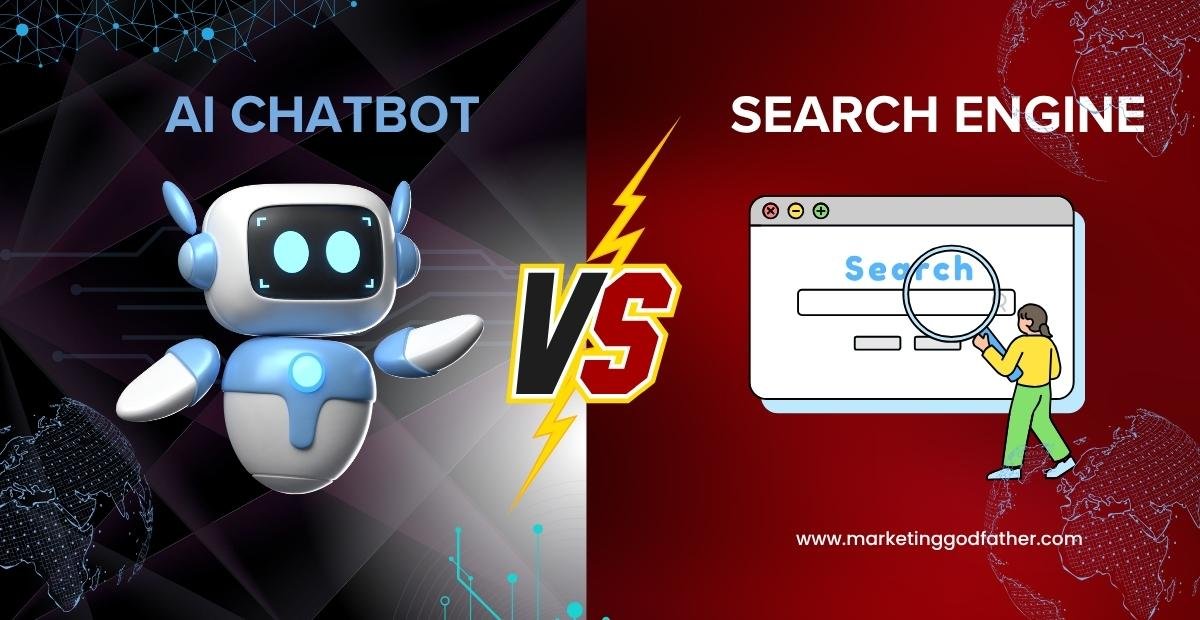In today’s digital world, getting answers is faster than ever. But with new tools emerging, the question of AI Chatbot vs Search Engine becomes more important. Search engines have long been our trusted guide, offering a list of links to explore. Meanwhile, AI chatbots are changing the game by providing instant, conversational responses. So, which one is better for your needs? Or are they meant to serve different purposes altogether? This post breaks down the comparison to help you decide. Curious to know which tool fits your daily questions best? Let’s dive into the next section and find out.
Let’s say you search: “best time to visit Japan.” Google shows travel blogs, weather sites, and tourism guides. Helpful, but scattered. Ask an AI chatbot the same thing, and it might say: “The best time to visit Japan is March to May for cherry blossoms, or October to November for fall colors, mild weather, and fewer tourists.”
What Is an AI Chatbot ?
An AI chatbot is a software tool that uses artificial intelligence to simulate human-like conversations. Instead of relying on pre-written scripts, it understands your input, processes it, and replies in real time just like a real person would.
Think of it as a virtual assistant you can talk to via text or voice. You’ve probably seen AI chatbots on websites offering instant support, in apps like ChatGPT, or even in customer service chats that answer your questions 24/7.
What makes AI chatbots different from basic ones? They use natural language processing (NLP) and machine learning. That means they can understand slang, learn from past interactions, and get better over time.
For example, if you ask an AI chatbot, “What’s the weather like in Delhi?” it won’t just scan for keywords, it will actually figure out your intent, fetch real-time data, and give you a relevant answer.
What Is a Search Engine ?
Search Engine is a tool that helps you find answers by scanning the web and showing a list of useful results. We have relied on it for years. But now, AI chatbots are offering quick, human-like responses that feel more direct and personal. This blog explores the growing debate of AI Chatbot vs Search Engine, comparing their key features, strengths, and use cases. Curious to know which one fits your needs better? Let’s dive into the next section.
AI Chatbot vs Search Engine: Key Feature Comparison
When it comes to finding answers online, both AI chatbots and search engines serve a purpose, but they work very differently. Let’s break down the key differences that matter most.
| Feature | AI Chatbot | Search Engine |
| Response Style | Conversational, direct answers | List of links and snippets |
| Speed | Instant, context-aware replies | Fast but requires user to browse through results |
| User Interaction | Interactive, human-like conversations | One-way interaction through typed queries |
| Personalization | High – adapts to user behavior and context | Low – general results for all users |
| Information Depth | Summarized or brief, based on training data | Broad access to detailed and diverse sources |
| Accuracy | Depends on training data and model updates | Depends on content quality and SEO |
| Use Case | Ideal for direct answers, support, content generation | Best for research, comparisons, and exploring sources |
| Learning Ability | Can learn and adapt in real-time (if enabled) | Does not learn from user behavior in real-time |
| Multitasking Capability | Can follow up on previous questions in context | Each search is standalone |
| Offline Availability | Limited or none | Requires internet, but broader access to cached content |
Use Cases: When to Use AI Chatbots vs Search Engines
Knowing when to use AI chatbots vs search engines can save you time and get you better results. Each tool has its strengths. Here’s how to pick the right one.
| Use Case | AI Chatbot | Search Engine |
| Quick Answers | Great for instant, direct responses | Good, but often requires digging through multiple sources |
| Customer Support | Excellent for handling FAQs, complaints, or live assistance | Not suitable for real-time conversations |
| Content Creation | Ideal for generating ideas, text, or summaries | Can help find inspiration or research articles |
| Learning & Tutoring | Useful for guided explanations and interactive help | Better for accessing educational platforms and detailed tutorials |
| Product Recommendations | Can offer tailored suggestions based on preferences | Useful for comparing products, reviews, and prices |
| Troubleshooting Issues | Good for step-by-step guidance | Helpful for exploring forums, videos, and community advice |
| Exploring News or Trends | May give brief overviews | Better for real-time, wide-range updates and perspectives |
| Complex Research | Limited; may lack source depth | Excellent for deep-dive research with credible references |
| Casual Conversations or Brainstorming | Great for idea generation and interactive fun | Not designed for conversations |
| Local Services (restaurants, shops, etc.) | Can provide general suggestions | Better for maps, hours, reviews, and detailed local listings |
The Future of Online Search: Will Chatbots Replace Search Engines?
Online search is evolving fast. With the rise of AI tools like ChatGPT, Google Gemini, and Perplexity, more people are asking: Will chatbots replace search engines?
The way we find information is shifting. Instead of typing keywords and digging through pages of links, users now get clear, direct answers in a natural, conversational flow. It’s faster, easier, and in many cases more helpful.
What’s Driving the Shift?
Here’s why chatbots are gaining ground in the search space:
- Fewer clicks, faster answers: Ask a chatbot, get a summarized response instantly, no need to scroll through multiple sites.
- Better context understanding: Unlike traditional search, AI understands follow-up questions and the full meaning behind your query.
- Personalized responses: Chatbots adapt to your intent and even your tone, offering more relevant suggestions.
All-in-one assistant: Many AI tools now summarize articles, generate content, compare products, and give recommendations all in one place.
But Are Chatbots Ready to Fully Replace Search?
Not quite. While chatbots are growing in popularity, search engines still rule when it comes to:
- Real-time updates (news, weather, stock prices)
- Visual and local search (maps, restaurant listings, product images)
- Browsing multiple sources (comparison shopping, reading reviews)
Most users still turn to Google or Bing for these quick tasks. But when it comes to complex questions, research, or decision-making, AI is starting to take the lead.
So, What’s Next?
We’re likely headed toward a hybrid future, where search engines and AI chatbots work together. Search will become more personalized, conversational, and intelligent. Think of it less like searching and more like having a smart assistant who already knows how you think.
Big tech companies are already betting on this. Google’s AI Overviews, Bing with Copilot, and dedicated AI search engines like Perplexity and You.com are just the beginning.
Conclusion: Choosing Between AI Chatbot vs Search Engine
If you’re looking for quick, conversational answers, AI chatbots shine. Need help drafting an email, summarizing a report, or brainstorming blog ideas? Tools like ChatGPT can handle all of that in seconds. They save time, cut the fluff, and make complex info easier to digest.
But when accuracy, variety, or up-to-date facts matter like finding the latest news, comparing product prices, or checking local services, a search engine is still your best bet. Google crawls billions of web pages and gives you the full picture, straight from the source.
In reality, most people use both. AI chatbots for productivity and quick tasks. Search engines for research and real-time info. Think of them as tools in your digital toolbox. The smartest move? Know when to use each and why.



